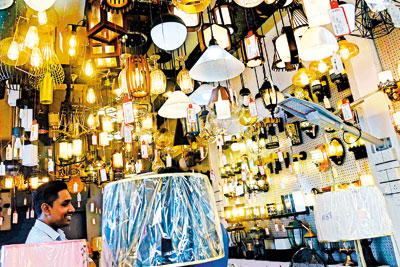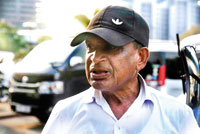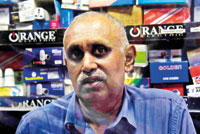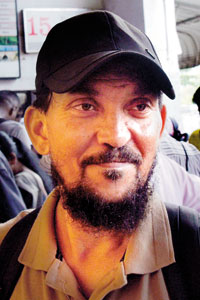News
Numerous costs still bite, despite slightly lower fuel and power bills
View(s):

Lampshade sellers say they have to pay high electricity bills as display lampshades have to be kept on throughout the day. Pix by Akila Jayawardena
By Kasun Warakapitiya
Despite reductions in fuel and electricity prices, merchants, eatery operators, and service providers said they cannot lower prices as their other costs remain high.
They said the government reduced the electricity charges only by a small amount after a bigger increase. The government is making people feel the cost of living is being reduced with elections in mind.
However, merchants and service providers said costs have increased. Most said they would wait for their next bill before deciding on any price reductions.
People feel that merchants raise prices when costs rise but will not cut prices when costs drop.
A private security firm employee, Chamara Samararatna, 40, said he had not witnessed a reduction in the cost of living.
Despite earlier revisions, the electricity tariff reduction was only 21.9%, he said, noting an earlier 18% increase.
A state sector employee, B.K. Ramyani Perera, 38, said she had Rs 60,000 in unpaid electricity bills.
She welcomed the tariff reduction but said prices of goods, three-wheeler hire charges, and bus fares had not come down.
Those living on the outskirts have not felt relief from reduced electricity and fuel prices.

J. Vitharana: Three-wheel driver
Puttalam resident A.M. Swathir, who sells string hoppers for a living, said his electricity bill, which was Rs 1,200, had increased to Rs 3,000.
He said the reduction in electricity tariffs would not be felt as the prices of several other goods and services are still high.
Transport service providers said the price reduction of 95 octane petrol and super diesel benefits the elite, not the ordinary person.
J. Vitharana, 69, a three-wheel driver who operates near the Fort Railway station, said fares can’t be reduced because the price of octane 92 petrol has not been reduced.
“We don’t use octane 95. Rich people use it. This shows the government does not care about the ordinary man,’’ he said.
Mr. Vitharana said he has to work even at his age due to the high cost of living.

Udaya Kumara: Salesman of electrical items, cables, holders, and bulbs in the Pettah
Even bus drivers and school van operators say they use the less costly fuel types, and the government has not reduced prices. They will not reduce fares.
Some complained that the prices of cooked meals and bakery products have not been reduced despite the reduction in the price of fuel and electricity.
Manoj Kumara, 44, who sells
lemons on the pavement in Pettah, said he earns Rs 5,000 a day on average and spends more than Rs 1,000 on meals.
“The eatery operators say although fuel prices have been reduced and the lower electricity bill is yet to be received, the cost of ingredients, as well as the price of gas, have not come down, forcing them to maintain high food prices,” he said.

A.M. Swathir: String hopper seller
Bakery Owner’s Association president N.K. Jayawardena said the CEB has increased the electricity tariff by 300% and reduced it by an average of 21.9%.
“The government increased the tariff in huge amounts and reduced it by a small amount. Still, the electricity tariff is high, and bakeries that use electric ovens and dough mixers are getting high bills,” he said.
Janaka Ratnayake, former chairman of the Public Utilities Commission of Sri Lanka (PUCSL), said the recent increases in tariffs were on top of previous revisions and added up to about 300%.
Udaya Kumara, 63, a salesman of electrical items, cables, holders, and bulbs in the Pettah, said he would wait to see what the reduction was.
He said that the price of electrical items would not be affected as it depended on sales.
A seller of lampshades and light bulbs, Isura Peshan Surasinghe, said he has to keep the display lampshades on throughout the day. His monthly bill is Rs 30,000, but it was Rs 20,000 before tariffs were revised last year.
“My electricity costs are high, but I cannot charge extra from customers. So, I only charge customers for the price of the items. Despite a reduction in electricity costs, I am forced to keep the prices of lampshades and other sales items unchanged,” he said.
The Electricity Users Association’s General Secretary, Sanjeewa Dammika, said the PUCSL should reduce tariffs by another 10%.
He said that the Ceylon Electricity Board (CEB) had earned Rs 61.2 billion by increasing tariffs, and therefore, it must reduce them.
Mr. Dammika said he believed that the recent tariff reduction was the result of protests.
“The CEB officials earlier said that they needed to increase tariffs by 33% before the price increase in October last year, but later reduced the amount to 18%; therefore, he is planning to file complaints at the Bribery Commission and Criminal Investigations Department regarding corruption,’’ he said.
The best way to say that you found the home of your dreams is by finding it on Hitad.lk. We have listings for apartments for sale or rent in Sri Lanka, no matter what locale you're looking for! Whether you live in Colombo, Galle, Kandy, Matara, Jaffna and more - we've got them all!

